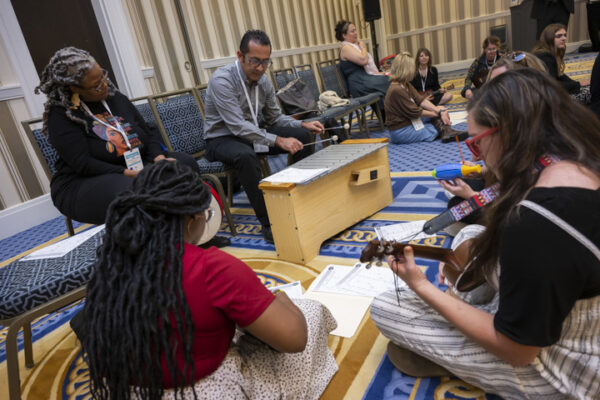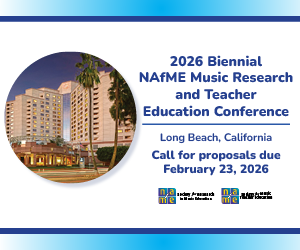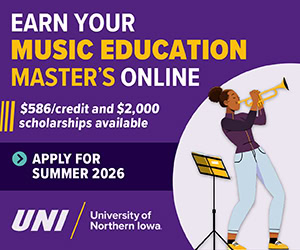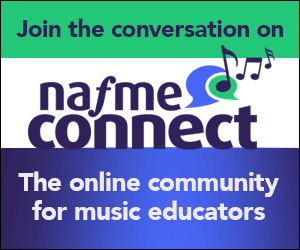/ News Posts / Agency, Influence, and Connection in Challenging Times
Agency, Influence, and Connection in Challenging Times
By NAfME Member Lisa Martin, Music Educators Journal Academic Editor
This article first appeared in the March 2025 issue of Music Educators Journal.
This column [“From the Academic Editor”] has provided a helpful nudge to prompt regular writing, and although I enjoy sharing my thoughts, I also find it difficult to offer musings amid a global climate wrought with conflict, pain, and uncertainty. Indeed, many of us may be questioning the larger meaning and impact of our daily efforts both in the classroom and beyond. Bidding farewell to the first quarter of the twenty-first century, we might find ourselves in moments or even seasons of existential inquiry. And in asking hard questions about the bigger picture, it can be easy to feel small or to sense our classroom efforts are quickly drowned out by the megaphone of the world outside.
In this stifling space, I feel overwhelmed by that which I cannot control. When I reflect on the “why” of that overwhelm, it often boils down to acknowledging a pervasive dissolution of choice and, in turn, my sense of agency. This feeling may translate to surrendering to an “it is what it is” mentality, that is, a mentality of resignation and even hopelessness.
The power of choice matters, and it matters a lot.
Researchers have determined that having choices in one’s life has numerous advantages, including increased internal motivation and improved overall well-being. More specifically, when an individual has the power to choose, the related sense of agency can lead to improved task outcomes.1 Agency, then, translates to “a person’s ability to control their actions and, through them, events in the external world.”2 Scholars note that agentic ability “is not something that people can have—as a property, capacity or competence—but is something that people do.”3 In other words, agency is an action- and engagement-centered orientation.4 This perspective falls in line with Albert Bandura’s theory of human agency, whereby he defines agency as “the power to originate action.”5

Photo by Arafat Khan on Unsplash
For teachers in particular, agency references the power to design and execute informed educational practices in the classroom.6 Factors influencing agency can include both internal considerations (circumstances within our control, such as our disposition) and contextual considerations (circumstances beyond our control, such as laws or regulations).7 In situations where contextual factors are limiting or prohibitive in nature, the resultant interruption of choice can overpower internal agentic feelings, thereby negatively affecting teacher agency.8 For example, standardized testing schedules reflect a common challenging contextual factor that can impact teachers’ sense of control. Curriculum mandates may leave teachers feeling their professional expertise has been undermined, similarly affecting overall agency. The ensuing feelings of powerlessness can have devastating effects on teachers’ health and professional commitment.
Loss of agency may feel particularly salient for music teachers, who otherwise have a relatively determined sense of control in daily classroom practice. Each day, music teachers make infinite decisions, small and large, that shape our environment and students’ learning experiences; in essence, there is often a default state of autonomy. When circumstances that lie beyond our control upset this autonomous flow, the disruption can feel especially intense.
Although there is some research emphasizing the importance of cultivating student agency, it is critical to also consider how music teachers themselves might maintain and even strengthen their own sense of agency in challenging times both in and out of the classroom. This effort is particularly critical in a time where “teachers are faced with a problematic choice—either continue to teach in contexts that constrain their agency or express their agency by and through leaving the profession.”9
In these difficult situations, music educators might find grounding by focusing not just on what we are able to control but also on broadening the scope and power of what we influence.
After all, what we directly control has a limited reach. From a Stoic lens, we can reasonably control our reactions and behaviors in our daily lives and manage aspects of our careers and classrooms, but beyond that, we are largely along for the wild ride of life. Influence, in contrast, reflects a distinctive reach, sliding into the “gray zone between what we can and cannot control.”10 Seeking opportunities to impart influence may contribute to much-needed feelings of agency and even resilience. Teachers might not be able to dictate certain policies and ecosystems that govern our classrooms and careers, but we may be in a position to shape or influence those contexts.
So, what might this influence look like, and how can we get there?
Common paths toward influence include efforts such as advocacy, educating others, and seeking leadership opportunities. These are all worthy and established avenues. The common denominator, however, is the relationships built through and because of these initiatives. In other words, we might aspire to influence our context through the quality and depth of the connections we establish within and outside of the classroom. Naturally, this can begin with the relationships we establish with our students. In what ways are we ensuring they feel seen and heard? In what ways are we empowering them to be agents of change? How are we fostering connections among our students and between our students and the larger community? By tackling these dimensions with intention and a focus on connection, we can guide and inspire our students in a manner that promotes their own sense of agency in the face of difficulty.
Another path toward expanding our relational influence may be through cultivating our professional connections. Teacher education scholars Tony Bartell and colleagues suggest that deepening professional networks can enhance agency through building social capital and professional validation. These relationships can provide an allyship that can afford more powerful momentum toward change and influence while also providing individuals with support for persistence.11 To build such connections, music teachers can look to their local networks and beyond. For example, NAfME webinars and state MEA conferences are useful platforms to connect with others who have similar interests and concerns.
A challenge, of course, is that it can take time to witness the effects of influence. That which we can control feels more concrete, whereas influence’s scope is far more ambiguous. Moreover, we must recognize that our efforts may not always yield the change we seek. Scholar Anna Katharina Schaffner affirms, “We can control our efforts in [the sphere of influence], but not necessarily the outcomes.”12 It may also be that the influence we carry does not yield actionable results on a desirable timeline. As the saying goes, “The day you plant the seed is not the day you eat the fruit.” It is important to remember that progress is not always linear, and moving the needle in even subtle ways may just afford the boost our agency needs in times of challenge.
In a world where choice and control may feel limited, I encourage music educators to seek out where and with whom they might have influence. From a one-on-one conversation with a student after class to speaking up for a cause at a local school board meeting. From mobilizing with area teachers to living our empathy out loud. Lean into each moment that can help us be the change we wish to see.13
Footnotes
- Raffaella Misuraca, Ashley E. Nixon, Silvana Miceli, Giovanni Di Stefano, and Costanza Scaffildi Abbate, “On the Advantages and Disadvantages of Choice: Future Research Directions in Choice Overload and Its Moderators,” Frontiers in Psychology15 (2024): 1290359.
- Patrick Haggard and Manos Tsakiris, “The Experience of Agency: Feelings, Judgments, and Responsibility,” Current Directions in Psychological Science18, no. 4 (2009): 242–46.
- Gert Biesta, Mark Priestley, and Sarah Robinson, “The Role of Beliefs in Teacher Agency,” Teachers and Teaching21, no. 6 (2015): 624–40.
- Guoyuan Sang, “Teacher Agency,” in Encyclopedia of Teacher Education, ed. Michael A. Peters (Springer Nature Singapore, 2020).
- Albert Bandura, “Toward a Psychology of Human Agency,” Perspectives on Psychological Science1, no. 2 (2006): 164–80.
- Sang, “Teacher Agency”; Biesta et al., “The Role.”
- Biesta et al., “The Role”; Brad Olsen and John McIntosh, “What Is Teacher Agency and How Can It Improve Education around the World?,” Brookings, April 3, 2024; Sang, “Teacher Agency.”
- Olsen and McIntosh, “What Is Teacher Agency?”
- Tony Bartell, Christine Cho, Corey Drake, Emery Betchauer, and Gail Richmond, “Teacher Agency and Resilience in the Age of Neoliberalism,” Journal of Teacher Education70, no. 4 (2019): 302–305.
- Anna Katherine Schaffner, “Understanding the Circles of Influence, Concern, and Control,” Positive Psychology, July 29, 2024.
- Bartell et al., “Teacher Agency and Resilience.”
- Schaffner, “Understanding the Circles.”
- These final words are a take on the famous quote often attributed to Mahatma Gandhi, “Be the change you wish to see in the world.”
Top photo by Tim Foster on Unsplash.
About the author:
 Lisa Martin is the Academic Editor of Music Educators Journal. She is Assistant Professor of Instruction at Ohio University in Athens, Ohio.
Lisa Martin is the Academic Editor of Music Educators Journal. She is Assistant Professor of Instruction at Ohio University in Athens, Ohio.
Interested in reprinting this article? Please review the reprint guidelines.
The National Association for Music Education (NAfME) provides a number of forums for the sharing of information and opinion, including blogs and postings on our website, articles and columns in our magazines and journals, and postings to our Amplify member portal. Unless specifically noted, the views expressed in these media do not necessarily represent the policy or views of the Association, its officers, or its employees.
Published Date
April 15, 2025
Category
- Careers
- Lifelong Learning
- Teacher Self Care
Copyright
April 15, 2025. © National Association for Music Education (NAfME.org)





